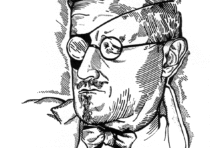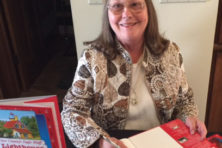Letter to the Editor: See the Exhibit, Read the Book!
- Share
- Tweet
- Pin
- Share
If you have not already seen the exhibit of paintings by DarRen Morris at the Unitarian Universalist Fellowship in north Ephraim, I urge you to do so before it closes March 25. Morris is an untrained (“naïve” or “outsider”) artist who was sentenced to life without parole in 1994 when he was 17. Having shown artistic talent as a boy, he turned to painting seriously in prison. Human figures with memorable facial expressions emerge from his work with dignity to capture the viewer’s imagination. Many of the works are accompanied by the artist’s comments, which often show his intent to heal his own wounds and ours. He says, “When I am inside a painting, I am not in prison.”
One of the most moving works in the show is “Hotbox” or “Boy in Closet.” As a child, Morris frequently found himself confined in this closet, empty except for large boxes of clothes and dark except for cracks between and under the sliding doors. The painting shows the naked child from the chest up, his arms already muscled and his expression bereft but resolute. No one believed him when he told them why his brother shut him in there. The brother appears in another piece titled “Evil, AKA Carl.” If ever there was a person less likely than Morris to benefit from being locked in a claustrophobic cell and more in need of medical care, I would be surprised. Yet here are the paintings!
If you want to know more after seeing the show, read the book based on his correspondence with Judith Gwinn Adrian, In Warm Blood, available for sale at the gallery. Adrian met Morris when she joined a prison ministry group. Her father had been incarcerated briefly as a young man for armed robbery, and she wanted to know more about how that experience had affected his later life. Unlike Morris, her father was released early to military service and became a doctor who later studied prison inmates!
The book came about because Morris gave Adrian a painting – a breach of rules that landed him in solitary confinement and prevented her from visiting him for five years! During this time, their letters addressed the painful topics of his childhood abuse, his precarious mental health and the events that put him in prison, along with Adrian’s continuing efforts to understand her father’s life. The letters also dispassionately record the way the prison system moved Morris from place to place, frequently putting him in solitary (or “seg”) and rarely offering help of any kind. The existence of the paintings under these circumstances is at least a bit of a miracle.
Since 2013, Adrian has arranged several exhibits of Morris’s art in Madison, Milwaukee and Eau Claire. She will be at the Fellowship on March 25 to discuss Morris’s art, their friendship and her experience with the prison system in Wisconsin. She will also sign copies of their book.
Estella Lauter
Fish Creek, Wis.



